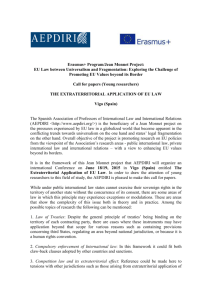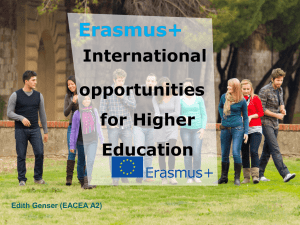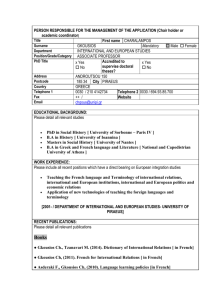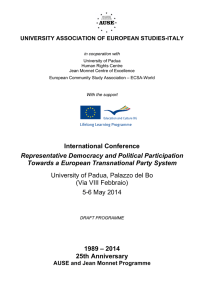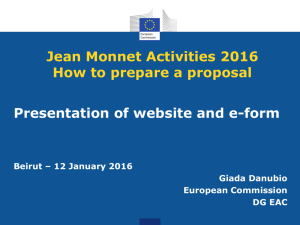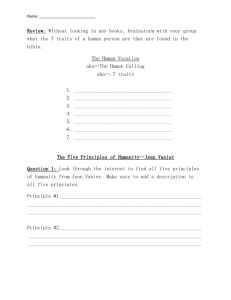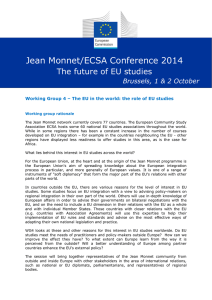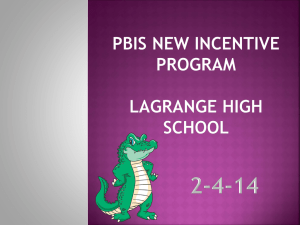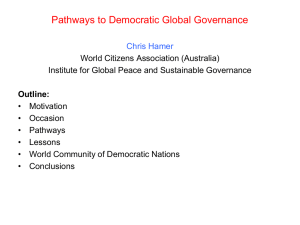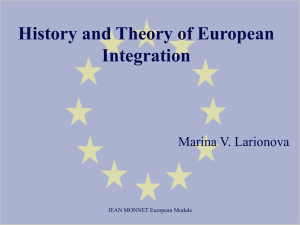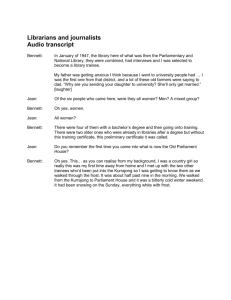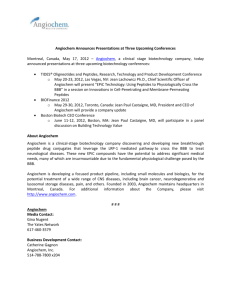EUROPEAN COMMISSION Education and Culture Lifelong
advertisement
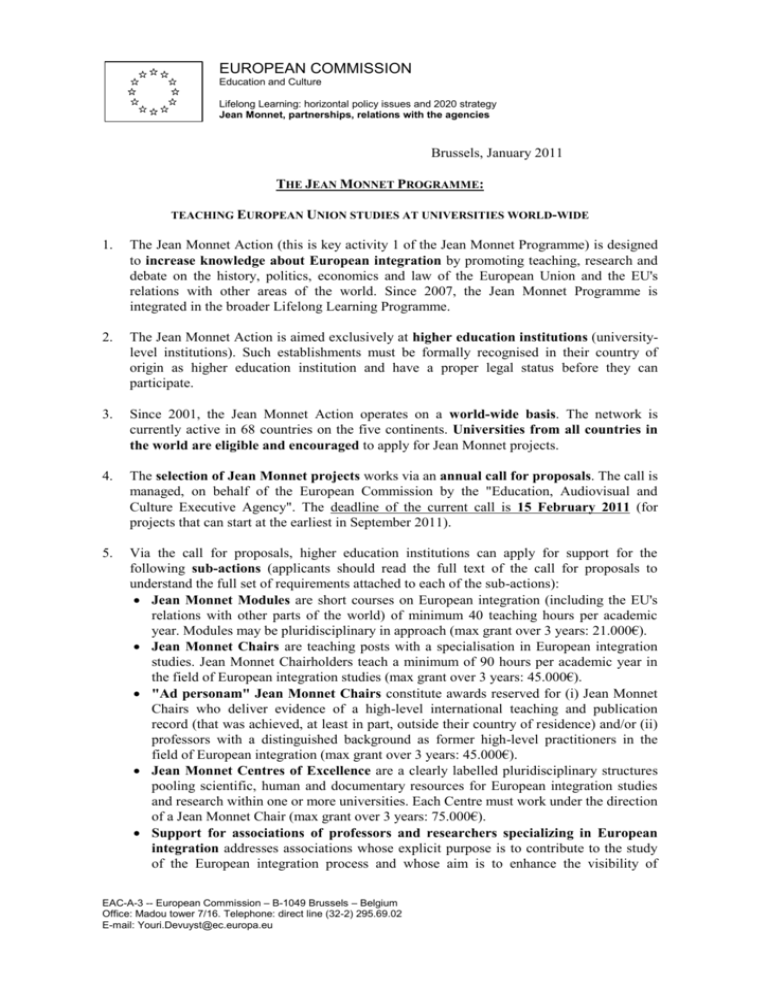
EUROPEAN COMMISSION Education and Culture Lifelong Learning: horizontal policy issues and 2020 strategy Jean Monnet, partnerships, relations with the agencies Brussels, January 2011 THE JEAN MONNET PROGRAMME: TEACHING EUROPEAN UNION STUDIES AT UNIVERSITIES WORLD-WIDE 1. The Jean Monnet Action (this is key activity 1 of the Jean Monnet Programme) is designed to increase knowledge about European integration by promoting teaching, research and debate on the history, politics, economics and law of the European Union and the EU's relations with other areas of the world. Since 2007, the Jean Monnet Programme is integrated in the broader Lifelong Learning Programme. 2. The Jean Monnet Action is aimed exclusively at higher education institutions (universitylevel institutions). Such establishments must be formally recognised in their country of origin as higher education institution and have a proper legal status before they can participate. 3. Since 2001, the Jean Monnet Action operates on a world-wide basis. The network is currently active in 68 countries on the five continents. Universities from all countries in the world are eligible and encouraged to apply for Jean Monnet projects. 4. The selection of Jean Monnet projects works via an annual call for proposals. The call is managed, on behalf of the European Commission by the "Education, Audiovisual and Culture Executive Agency". The deadline of the current call is 15 February 2011 (for projects that can start at the earliest in September 2011). 5. Via the call for proposals, higher education institutions can apply for support for the following sub-actions (applicants should read the full text of the call for proposals to understand the full set of requirements attached to each of the sub-actions): Jean Monnet Modules are short courses on European integration (including the EU's relations with other parts of the world) of minimum 40 teaching hours per academic year. Modules may be pluridisciplinary in approach (max grant over 3 years: 21.000€). Jean Monnet Chairs are teaching posts with a specialisation in European integration studies. Jean Monnet Chairholders teach a minimum of 90 hours per academic year in the field of European integration studies (max grant over 3 years: 45.000€). "Ad personam" Jean Monnet Chairs constitute awards reserved for (i) Jean Monnet Chairs who deliver evidence of a high-level international teaching and publication record (that was achieved, at least in part, outside their country of residence) and/or (ii) professors with a distinguished background as former high-level practitioners in the field of European integration (max grant over 3 years: 45.000€). Jean Monnet Centres of Excellence are a clearly labelled pluridisciplinary structures pooling scientific, human and documentary resources for European integration studies and research within one or more universities. Each Centre must work under the direction of a Jean Monnet Chair (max grant over 3 years: 75.000€). Support for associations of professors and researchers specializing in European integration addresses associations whose explicit purpose is to contribute to the study of the European integration process and whose aim is to enhance the visibility of EAC-A-3 -- European Commission – B-1049 Brussels – Belgium Office: Madou tower 7/16. Telephone: direct line (32-2) 295.69.02 E-mail: Youri.Devuyst@ec.europa.eu regional or national scientific and physical resources in this domain (max grant over 3 years: 24.000€). Support for information and research activities are, in fact, grants for the organisation of conferences, seminars, and roundtables on European integration (max grant over 1 year: 40.000€). Jean Monnet Multilateral Research Groups are partnerships between at least three Jean Monnet Chairs from three different countries leading to the creation of an integrated academic network with a joint research plan and pluridisciplinary synergies in the field of European integration studies (max grant over 2 years: 80.000€). 6. The Jean Monnet selection is centralised in Brussels to ensure full coherence in the application of the award criteria to applications from any country. Applications are submitted directly by the applying institution to the “Education, Audiovisual and Culture Executive Agency” on the standard application forms. They do not transit via government departments, permanent representations or other formal channels. 7. The selection is based on a rigorous peer review system: independent academic experts (university professors) perform an assessment of the quality of each application in light of the published award criteria. Political or geographic considerations play no role in the selection. 8. Applications are assessed on the basis of four "award criteria": Quality of the Applicants: Excellence of the academic profile (CVs) in the specific field of European integration studies. Quality of the methodology and the work programme: Quality and detail of the planned teaching, research and/or debating activities (with particular attention to the academic added value, the multidisciplinary synergies and the openness to civil society). Impact and relevance of the results: Likely impact of the activities on education and/or training at the European and/or world level, with specific attention for activities outside the EU. Innovative Character: Degree of innovation of the project: creation of new teaching, research and/or debating activities (as appropriate); application by higher education institutions / associations in countries not yet covered by the Jean Monnet Action or higher education institutions/ associations not yet supported by Jean Monnet funding or involving academics not yet in receipt of Jean Monnet funding for the same type of activity. 9. In addition to the co-financing, selection during the Jean Monnet call for proposals brings academic prestige and recognition, networking opportunities within the Jean Monnet community, and the possibility to participate in Jean Monnet reflection activities (conferences and seminars). 10. The Commission does not impose any restrictions on the academic freedom of recipients of Jean Monnet professorships. The Jean Monnet network is valuable and academically prestigious precisely because it constitutes a reservoir of independent and critical analysis on European Union questions. The Jean Monnet call for proposals and application forms are available on the website of the "Education, Audiovisual and Culture Executive Agency" (EACEA): http://eacea.ec.europa.eu/llp/funding/2011/call_jean_monnet_action_ka1_2011_en.php For further information on the Jean Monnet call for proposals, please contact the EACEA at the following mailbox: EACEA-AJM@ec.europa.eu. 2
